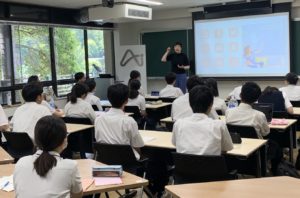2023.Aug.23
REPORTSReport on B’AI Global Forum Lecture Entitled “Artificial Intelligence and Society” for Fukuoka Prefectural Chikushigaoka High School Students
Kayoung Kim (Project Researcher of the B’AI Global Forum)
・Date: Friday, August 4, 2023, 10:30am-12:00pm
・Venue: Room 327, Faculty of Science Bldg.3 (The University of Tokyo, Asano Campus)
・Language: Japanese

On August 4, 2023, the B’AI Global Forum welcomed 30 second-year students from Fukuoka Prefectural Chikushigaoka High School, who were participating in a training program at the University of Tokyo and hosted a lecture titled “Artificial Intelligence and Society.” Led by Professor Yuko Itatsu, the director of the B’AI Global Forum, the team also included Project Assistant Professor Kyoko Takeuchi, Project Researcher Kayoung Kim, and Graduate Student Member Priya Mu. Each presenter connected their expertise with AI, offering insights on various issues and social challenges to the students.
To start, Kim delivered a presentation titled “Media and Information Space in the Age of AI.” She introduced examples of AI applications in journalism, simultaneously shedding light on concerns stemming from algorithms that influence online environments, including biases in the dissemination of information commonly known as “echo chambers” and “filter bubbles.” Additionally, she highlighted the potential issue of utilizing individuals’ online activity histories as machine learning data without their awareness.
Next, Takeuchi, specializing in gender and sexuality studies, presented “Gender Bias in the Use of AI: Focusing on the Experience of Transgender Individuals.” Takeuchi explained the existence of diverse genders beyond the binary framework and emphasized that AI technologies like image recognition and voice assistants could reinforce existing gender biases by excluding transgender and non-binary individuals. Also, it was stressed that interdisciplinary discussions among researchers are necessary to promote diversity in the societal implementation of AI.
Moreover, from the perspective of architectural studies, Mu discussed “AI and Design.” The presentation highlighted instances of AI utilization in architecture, including SoftBank Group’s Smart Building and a previous project in which Mu was involved. She also emphasized the importance of designing with the principle that “machines should adapt to humans more than humans adapt to machines” in AI application within architecture.
Professor Itatsu then delivered a lecture on “Artificial Intelligence and Society,” aiming to provide students with a comprehensive understanding of AI’s potential and challenges. Various examples were presented to illustrate potential pitfalls in seemingly neutral AI technologies, leading to human rights violations. These examples included face recognition systems with varying accuracy based on race and gender, as well as the problematic case of the U.S. recidivism prediction algorithm that exhibited racial bias. Additionally, the lecture discussed how societal biases and preconceptions are reflected in AI design and representation, exemplified by the “AI Sakura-san” at Tokyo’s Takanawa Gateway Station, which faced criticism for perpetuating gender stereotypes. Through this case, Professor Itatsu highlighted the importance of values held by those involved in AI development. Furthermore, regarding the issue of balance on the development side, it was pointed out as a challenge that there is a significant overrepresentation of males. In addition, from a global perspective, the current uneven distribution of AI-related human resources and research achievements, disproportionately favoring the United States and China, was highlighted.
During the Q&A session, students posed numerous thought-provoking questions regarding AI and humanity. These inquiries ranged from whether AI would eventually replace human jobs, the potential for AI to dominate humans, to the ideal coexistence between AI and humans. The influence of culture on AI perceptions was also discussed.
Despite the time constraints, it was a valuable opportunity to exchange a wide range of discussions concerning AI. It is hoped that this lecture provided the students, who will shape the future AI society, with an opportunity to contemplate the societal and ethical challenges posed by AI.